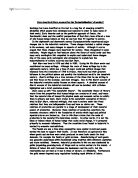Weber can be said to agree with Marx concerning the alienation of the individual in Industrial Society. For Weber this centers around the 'rationalization' of the West due to the spread of bureaucracy. Weber's belief was that Industrial Societies inevitable trend was to more and more rationalization. Thus he was certain bureaucracies were the most efficient and most rational known means of exercising authority over human beings. Offices are ranked in a hierarchical order and their operations are characterized by impersonal rules also appointments are made according to specialized qualifications. Therefore bureaucracies were thought to be reliable, precise and stable. Bureaucracies were also based on legitimate authority, in that it functioned either on the basis of procedures that could be altered or through a system of rules and regulations. But Weberian bureaucracies faced the problem of control and enforcing powers thus they did not appear to be unambiguously effective. ‘The only thing that saves us from bureaucracy is inefficiency. An efficient bureaucracy is the greatest threat to liberty.’(Eugene McCarthy gjgjgjhg) Weber argued that the bureaucratization of the modern world has led to its depersonalization which he felt would result in the 'iron cage' of a totally administered society, where impersonal relationships replaced personal relationships, through making all activity - work and leisure - one of control and exchange. Further bureaucratization and rationalization seemed to Weber an almost inescapable fate.
Alienation on the same grounds is a subjective feeling, a feeling of individual powerlessness and detachment from self. In the 'Paris Manuscripts' (1844) Marx outlines four key forms of alienation, firstly, that the worker in the capitalist system has lost control of his labour, secondly, through the division of labour, thirdly, man is alienated because his work relationships with his co-workers is not one of natural human unity and fourthly, the worker is denied his true nature through the lack of self expression in his work. Marx's works have been fight against alienation to bring into being his essential political belief that communism is the true nature of humankind; his work is an attempt to battle the ideological superstructure of Capitalism and so he is fighting to relieve false consciousness. Exploitative relationships and false consciousness generated by alienation, made the worker feel like a commodity and thus, planted the seeds of Communism in Capitalism's very womb. 'A spectre is haunting Europe - the spectre of Communism.' (Taylor, 1967:78) For Marx man’s labor is his self-expression and by alienating him from it, he is alienated from himself. Therefore both Marx and Weber agree that the new world of rationalized efficiency has turned into a monster that threatens to dehumanize its creators. But Weber unlike Marx believes that the future would be an "iron cage" rather than a Garden of Eden.
The area of social stratification has been the starting point of many arguments about how and why societies are divided. Marx claims that that “the fate of the individual is determined extensively by material and economic factors and to a very great degree is dependent on anonymous socio-economic processes” (Mommsen 1989: 55). Therefore for Marxists, class is a matter of economics. There are two main classes: the bourgeoisie and the proletariat. The bourgeoisie consist of those individuals who own the means of production, property, factories, and etc, and exploit the proletariat who only own, or can sell their labour to the bourgeoisie. The bourgeoisie gain profit from the proletariat by extracting surplus value, that is, by paying them less than the product is worth. The bourgeoisie creates a degree of class-consciousness amongst the proletariat, thus they do not feel exploited. For Marx, class is all about conflict between economic groups. This conflict has the bourgeoisie (the minority) along with society’s infrastructure (education, religion, bureaucracy etc) on the one side and the proletariat (the majority) on the other. The class struggle necessarily leads to the dictatorship of the proletariat. All relations between the two classes are economic and therefore there will be little chance to move from one class to another.
Weber, on the other hand, argued that economic factors are no the sole determining force of social stratification. Weber argues that, “people are influenced by a multitude of other factors as well, including religious beliefs, traditional modes of behavior and particular values” (63). He defines a class as a group of individuals who share a similar position in a market economy, and by virtue of that fact receive similar economic rewards. Therefore, according to Weber, a person’s class situation is basically their market situation. Weber identifies several other factors, which can determine group formation and the stratification of society. In particular, groups form because their members share a similar ‘status situation.’ Whereas class refers to the unequal distribution of economic rewards, status refers to unequal distribution of ‘social honor.’ Weber also identifies another important factor in determining social stratification, that of ‘party.’ Weber defines parties as groups, which are specifically concerned with influencing policies and making decisions in the interest of their membership - that is, they are concerned with the acquisition of ‘social power.’ While Marx argued that classes formed the only significant groups in society, Weber argued that the interplay of class, status and party led to the formation of social groups.
Karl Marx and Max Weber’s conceptions, lead them to very distinct conclusions about the rise of modern capitalism. Upon careful comparative analysis, a conclusion can be made about the extent to which these theorists are complementary or competing. Marx was too mechanistic, closed off to other causal factors besides that of the economic base. He took historical materialism and historical laws to an extreme and may have been stuck in the one-dimensionality of its causal chain. Weber, on the other hand, was quite ambivalent. He avoided making conclusions about the primacy or significance of certain variables and seemed to lack focus in this respect.







